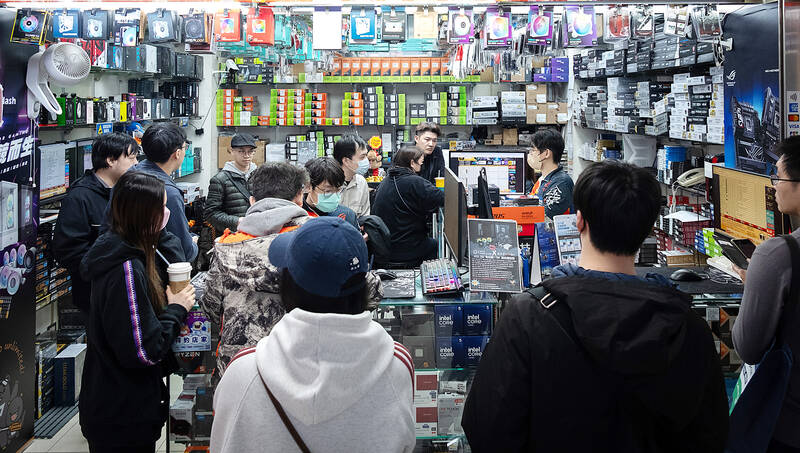Taiwan’s chip industry can now have a temporary reprieve, as semiconductors have been listed among imports exempted from the latest round of tariffs announced on Wednesday by US President Donald Trump, an analyst said yesterday.
The exemption of semiconductors gave some insight into Trump’s tactics, equity analyst Andy Hsu (許博傑) told the Central News Agency (CNA) in a phone interview in Taipei.
“Trump made some tariff threats at first, then TSMC [Taiwan Semiconductor Manufacturing Co, 台積電] pledged massive investments in the United States,” Hsu said, referring to TSMC’s announcement on March 3 that it would invest another US$100 billion in Arizona over the next few years.

Photo: CNA
“For now, Taiwan’s semiconductor industry can have a brief reprieve, but an unpredictable Trump means uncertainties remain, so I do not think the industry can stop worrying about tariff threats for too long,” Hsu said.
Furthermore, there are concerns about whether Trump would withhold the funding pledged by the previous US administration for semiconductor investors such as TSMC under the CHIPS and Science Act, Hsu said.
The White House has a goal to obtain billions more in commitments without the need to expand such grants, according to US Secretary of Commerce Howard Lutnick in a recent news report.
An industry expert told CNA that that the US government might ask Taiwanese semiconductor suppliers to lower the prices of their products and services, including those in the wafer foundry, integrated circuit design, and chip packaging and testing sectors.
While big suppliers could afford to drop prices to appease the US government, their smaller counterparts cannot make such big cuts, which might lead to a decline in their shipments or even a full exit from the market eventually, said the expert, who asked not to be named.
Meanwhile, TSMC’s response to the US’ latest tariff policies would be closely watched, as the company prepares to hold an investors’ conference on April 17, the expert said.
Trump has said publicly on several occasions that TSMC’s investments in the US would hit US$200 billion or even US$300 billion, which analysts said raises the question of whether the chipmaker would pour even more funds into the US amid the tariff threats.
Analysts have said there is some worry about leaks of TSMC trade secrets if it yields to prospective US government pressure to take a stake in Intel Corp to improve the US chipmaker’s foundry operations.

IN THE AIR: While most companies said they were committed to North American operations, some added that production and costs would depend on the outcome of a US trade probe Leading local contract electronics makers Wistron Corp (緯創), Quanta Computer Inc (廣達), Inventec Corp (英業達) and Compal Electronics Inc (仁寶) are to maintain their North American expansion plans, despite Washington’s 20 percent tariff on Taiwanese goods. Wistron said it has long maintained a presence in the US, while distributing production across Taiwan, North America, Southeast Asia and Europe. The company is in talks with customers to align capacity with their site preferences, a company official told the Taipei Times by telephone on Friday. The company is still in talks with clients over who would bear the tariff costs, with the outcome pending further

A proposed 100 percent tariff on chip imports announced by US President Donald Trump could shift more of Taiwan’s semiconductor production overseas, a Taiwan Institute of Economic Research (TIER) researcher said yesterday. Trump’s tariff policy will accelerate the global semiconductor industry’s pace to establish roots in the US, leading to higher supply chain costs and ultimately raising prices of consumer electronics and creating uncertainty for future market demand, Arisa Liu (劉佩真) at the institute’s Taiwan Industry Economics Database said in a telephone interview. Trump’s move signals his intention to "restore the glory of the US semiconductor industry," Liu noted, saying that

NEGOTIATIONS: Semiconductors play an outsized role in Taiwan’s industrial and economic development and are a major driver of the Taiwan-US trade imbalance With US President Donald Trump threatening to impose tariffs on semiconductors, Taiwan is expected to face a significant challenge, as information and communications technology (ICT) products account for more than 70 percent of its exports to the US, Chung-Hua Institution for Economic Research (CIER, 中華經濟研究院) president Lien Hsien-ming (連賢明) said on Friday. Compared with other countries, semiconductors play a disproportionately large role in Taiwan’s industrial and economic development, Lien said. As the sixth-largest contributor to the US trade deficit, Taiwan recorded a US$73.9 billion trade surplus with the US last year — up from US$47.8 billion in 2023 — driven by strong

STILL UNCLEAR: Several aspects of the policy still need to be clarified, such as whether the exemptions would expand to related products, PwC Taiwan warned The TAIEX surged yesterday, led by gains in Taiwan Semiconductor Manufacturing Co (TSMC, 台積電), after US President Donald Trump announced a sweeping 100 percent tariff on imported semiconductors — while exempting companies operating or building plants in the US, which includes TSMC. The benchmark index jumped 556.41 points, or 2.37 percent, to close at 24,003.77, breaching the 24,000-point level and hitting its highest close this year, Taiwan Stock Exchange (TWSE) data showed. TSMC rose NT$55, or 4.89 percent, to close at a record NT$1,180, as the company is already investing heavily in a multibillion-dollar plant in Arizona that led investors to assume